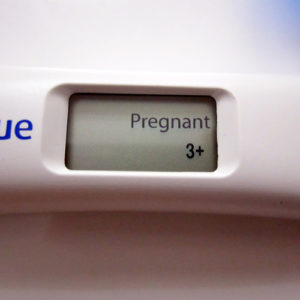It’s no secret that pregnancy tests can be a tad pricey and as a result, a lot of women have started to create their own “homemade pregnancy tests” using toothpaste. Although there have been no scientific studies to back up the claim, a lot of people are claiming that this homemade method works.
This craze, which has been around for a few years, has recently gained a lot of attention through online videos, forum posts, and blog posts.
According to Google Trends, over the last 10 plus years the term “toothpaste pregnancy test” has steadily increased – showing that more people are giving into this crazy idea that toothpaste can indicate pregnancy.
There have even been a lot of online videos where women have filmed their pregnancy tests to show what a positive test result will look like.
As bizarre as the toothpaste pregnancy test may sound, there’s actually some logic behind why it might work – though whether it provides accurate results is still up for debate. You see, most toothpastes contain aluminum compounds like aluminum potassium sulfate. When these aluminum compounds interact with the natural acidity in your urine, it can cause the toothpaste to fizzle and change colors. Now here’s where the pregnancy connection comes in…
During early pregnancy, certain hormones like human chorionic gonadotropin (hCG) cause increased acidity in a woman’s urine. So in theory, if the urine is more acidic due to hCG from being pregnant, it could potentially lead to more dramatic fizzing and color changes when mixed with the aluminum compounds in toothpaste. Kind of cool, right?
Of course, using a store-bought pregnancy test that detects precise hCG levels is far more reliable than mixing your pee with Colgate. But that novelty factor of the toothpaste trick is what makes it so intriguing, even if the results are inconclusive. It’s like a fun little science experiment you can try at home. Just don’t take it too seriously as a definitive pregnancy test!
For a more scientific look at how it might work, let’s explore the ingredients. Most standard white toothpastes contain a mild abrasive like hydrated silica to help scrub away plaque and surface stains. They also have detergents like sodium lauryl sulphate to create that signature foamy lather. Here’s where it gets interesting – many toothpaste brands add aluminium compounds as an anti-caking agent and to give that cool, tingly clean sensation.
When you introduce an acidic substance like urine, those aluminium compounds can potentially react in fascinating ways. As the acidity increases, you may see more vigorous fizzing from the sodium compounds releasing carbon dioxide gas. The changing pH levels could also cause color changes, such as the paste taking on a more blue-green tint from the copper compounds present. It creates a wild, foaming chemical reaction right there on your plate!
Now, does a more intense fizz definitively mean you’re pregnant? Not necessarily. Urine acidity gets impacted by all kinds of factors like your diet, medications, hormones, and more. A positive toothpaste reaction could simply mean your urine is highly acidic that day for any number of reasons. That’s why it’s just a quirky folk trick, not medical advice!
Those zany toothpaste pregnancy videos you see online are pure entertainment value. They make for a funny story, but definitely don’t replace an accurate test from your doctor or drugstore. Whether the toothpaste is frothing like a kindergarten science volcano or sitting there motionless, the only way to know for sure is with a proper pregnancy test. That said, give it a try sometime just for kicks – it’s a delightfully weird idea that connects us back to those imaginative homespun remedies our grandmothers used to use. Just don’t stake your family planning on a tube of Crest!
How Does the Toothpaste Pregnancy Test Work?
Conducting a homemade pregnancy test with toothpaste is fairly simple. For this test, you simply place a small amount of toothpaste onto a plate and then add a few drops of urine to the toothpaste.
If the test is positive and you are pregnant, the toothpaste will change colour and possibly froth (frothing doesn’t always occur). If the test is negative and you are not pregnant, the toothpaste will remain the same colour and won’t change.
According to one of the websites which promote this homemade toothpaste pregnancy test, toothpaste’s chemical structure interacts with the chemical structure to that of a pregnant woman’s urine. As a result, the changes which we mentioned above occur. This same website also stated that this toothpaste test has been used for years and that women have yielded the correct result from using it.
There’s no way for us to comment on the accuracy of this test as there has been no official scientific study in regard to it. That being said, GPs and other health professionals have said that regardless of what result women yield from the toothpaste pregnancy test, they should always use a traditional pregnancy test which can be bought from most stores. Under no circumstances should the toothpaste tests be solely relied on for pregnancy results.
What Causes the Toothpaste to React?
The toothpaste fizzes after urine is mixed with it is a result of the acid property that is in urine. This acid, when combined with calcium carbonate (a key ingredient in toothpaste), will release carbon dioxide and will fizz. If your urine contains more acid, the more the toothpaste will fizz. Regardless of whether or not you are pregnant, there is acid present in your urine; thus, this test is unreliable.
Better To Use a Traditional Pregnancy Test
Women, who think that they might be pregnant, are strongly encouraged by health professionals to take a conventional pregnancy test. The toothpaste test is really just ‘bit of fun’ and should not be relied on for accurate results. Using a “proper” pregnancy test is the only way of ensuring accurate pregnancy test results.
Zoom Baby can supply you with the perfect pregnancy test if you don’t want to waste toothpaste! In our wide range, we currently off pregnancy test strips, NHS-approved pregnancy test cassettes, and midstream pregnancy tests. We also offer a full range of pregnancy test from top brands such as Clearblue, First Response and Suresign.
There are ways of getting a free pregnancy test locally. According to the NHS, you are able to get a pregnancy test from places such as:
– your local GP
– a pharmacy
– a sexual health clinic
– a contraception clinic
– most NHS walk-in centres
Unless you purchase a pregnancy test from high street shop such as Sainsbury’s, Asda, Superdrug or Boots, you are able to get a pregnancy test for free (even if you are younger than 16).
Photo credit; “Toothbrush” by Anthony Cunningham for Zoom Baby
Zoom Baby is a leading supplier of Pregnancy Tests and Ovulation Test Kits





